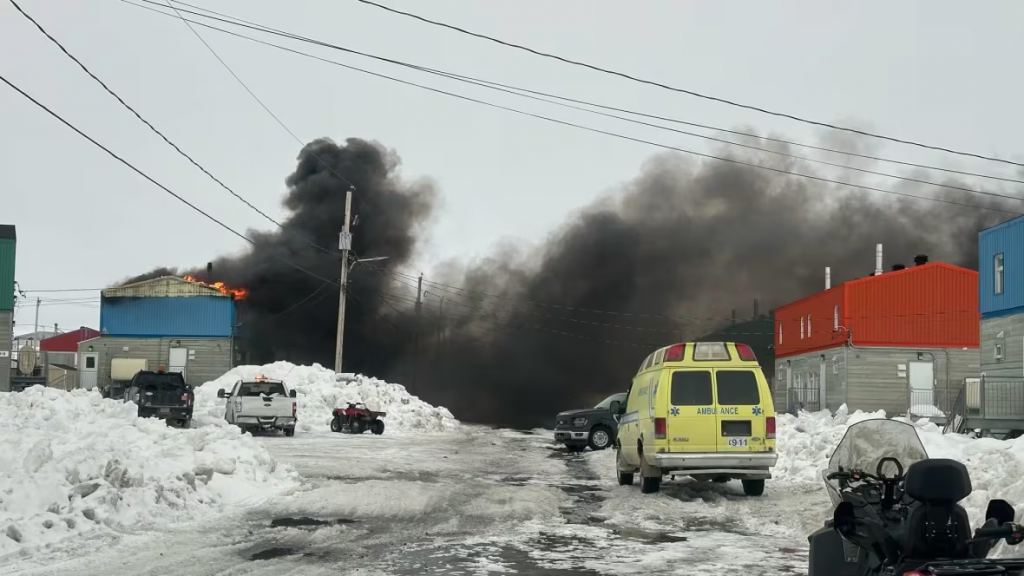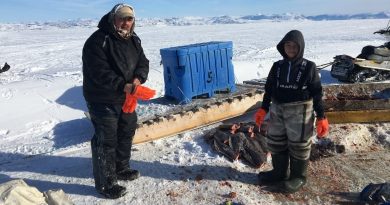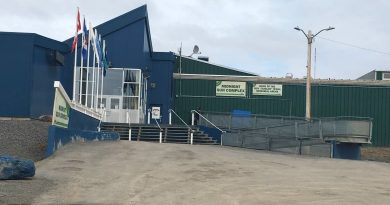Puvirnituq, Que. school year ends early over water shortage emergency

The school year has come to an early end in Puvirnituq, Que., due to continuing issues regarding access to drinking water, water delivery and waste water management in the northern community.
In a news release on Monday, Kativik Ilisarniliriniq — the local school board — said that in the current context, it could not “ensure the continuity of educational services” and was gradually closing two of its schools, effective Tuesday.
The board emphasized students would not be penalized and those needing to write end-of-year exams to get compulsory high school credits would be able to do so.
The closures of Iguarsivik and Ikaarvik schools, attended by students in elementary and high school, comes after a fire broke out Saturday, exacerbating an existing water shortage and prompting the mayor to declare a state of emergency.
No one was injured in the fire, but the blaze, which broke out at around 3 p.m. in the Inuit village of 2,100 people, was only put out at around midnight.
Puvirnituq Mayor Lucy Qalingo said in a statement that firefighting efforts were hampered by blizzard conditions, strong winds and the area’s very limited water supply.

Access to water has been limited for two months, ever since a pipe that connects the pump station to the treatment plant froze in mid-March.
That has forced the village to drive farther out of town to truck in water which then needs to be manually chlorinated, slowing the delivery of water.
Difficult weather conditions, including slushy roads and a series of blizzards, have made the situation worse.
In an interview with CBC News on Sunday, Qalingo described unsanitary living conditions stemming from water access issues.
“There are homes, their toilets are filled with feces because we don’t have any running water. And for those who are less fortunate, they’re thirsty,” she said.
Local health facilities in Puvirnituq have also been affected, with more than two dozen people flown south from the hospital and a care home for seniors.
Students are struggling, teacher says
The school board said essential staff remain present at the schools and teams have been working with municipal authorities to develop an emergency plan and “provide water access points” to residents.
As for the upcoming school year, the board said additional resources will be put in place for students who need “catch-up instruction.”
Alyssia Bray, a teacher in Puvirnituq, says her Grade 7 and 8 students have been struggling since mid-March due to ongoing water shortages in the community.
They live at home with large families and the water shortage means they haven’t been able to take showers.
“It’s just really rough for them to come in and feel up to learning and engaging when they feel their hygiene isn’t at the level it should be,” said Bray, who just completed her first year on the job.
Bray said news that the school would be closing early was also hard on students.
“It came so suddenly. I think it was just a shock to everybody, especially because my students were just finishing exams.”
The school made arrangements for some students to return and complete exams required for graduation or to pass the year. Bray said many teachers left, but she and others stayed behind to help students who still needed to write exams.
“We stayed behind a little longer to make sure they are not penalized for that,” she said.
Temporary pipeline work underway
Work by the Kativik Regional Government on a temporary pipeline is underway and could be operational later this week.
Quebec Public Security Minister François Bonnardel said on Tuesday that after discussions with regional authorities, an official request has been made at the federal level for Canadian Rangers to assist on the ground in Puvirnituq.
Rangers are a sub-component of the Canadian Army Reserve who live and work in remote, isolated and coastal regions of the country.
In a post on X, Bonnardel said the Rangers would support ongoing operations including the distribution of water and essential supplies, as well as providing technical and logistical support.
“The Rangers are the fastest, most efficient, and most appropriate option for immediate intervention without putting additional operational pressure,” he wrote in French, explaining the request.
Over the weekend, more than 50,000 litres of water were flown into the community, with more shipments expected this week.
Related stories from around the North:
Canada: Aupaluk residents fed up with lack of safe drinking water, CBC News



